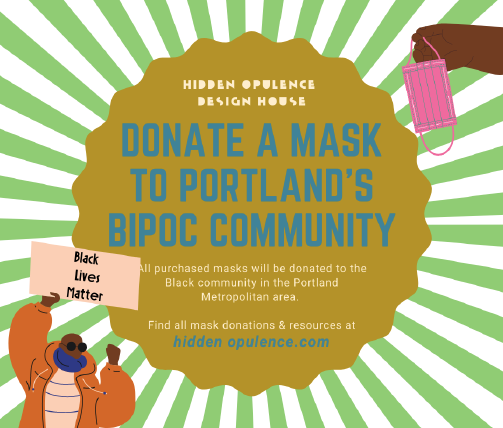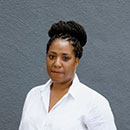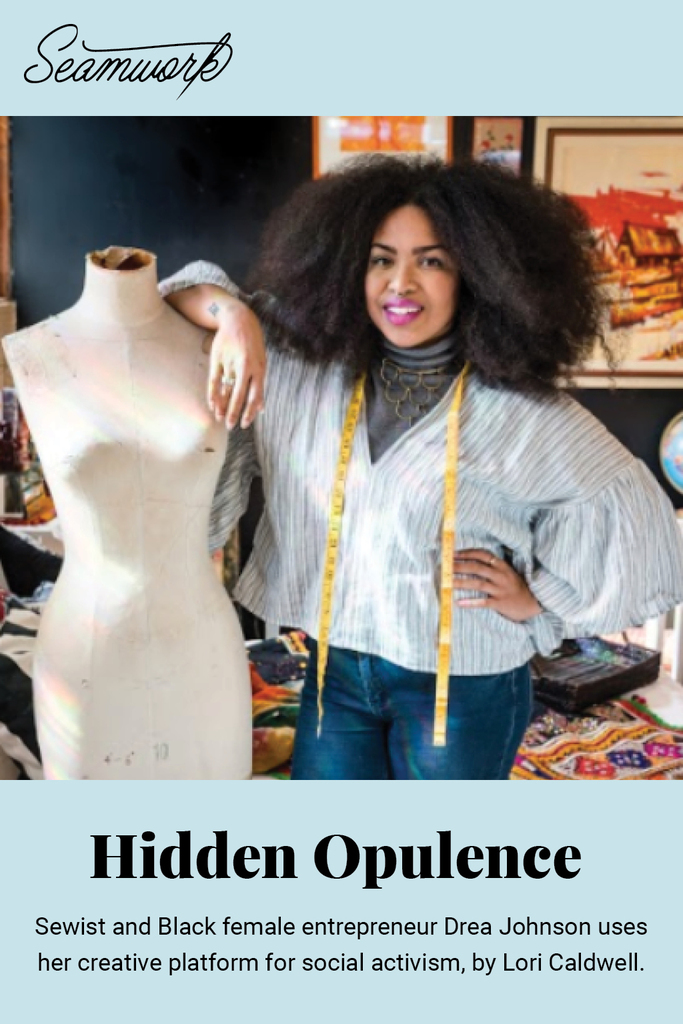Sewing has been the creative inspiration for Drea Johnson, founder and owner of Hidden Opulence, a business based in Portland, OR which specializes in small-batch alterations and vintage clothing repair, since she was a child.
Drea: I’ve been sewing since I was like five...There was an episode of Reading Rainbow. The book that they covered—which I just bought last year—it’s called, The Patchwork Quilt. They highlighted that book in the episode and I remember after that I was like, ‘Wait why don’t we have a patchwork quilt?’ It was so cute ‘cause, of course, it’s a Black grandma, it’s a Black family, and the little girl. My mom would always try to buy books with little Black girls so I could be like, ‘Oh, my hair! It’s the same.’ So, I was a really inspired kid from that book.
Drea was so creatively inspired that she tried to recreate that quilt as a child.
Drea: Our next-door neighbor, she was—she kind of did it all. She was an immigrant from Mexico, and she did sewing and Halloween costumes, she cleaned houses, she did it all. Her name was Cecilia...I would go over there and she would give me scraps from her projects. I remember taking those home and making like a little makeshift quilt...From there, I was always interested in sewing.
It’s important for creatives to use their talents because it helps the masses stay engaged. Creatives using a multitude of means to be involved and push social activism is so important to keep everyone motivated because social activism is exhausting. Through overwhelm you get burnout and it’s the wonderful works of books, art, craft, song, and dance that keep us revitalized and inspired to continue the work that has to be done to create the world we so wish to live in.
That interest grew, not only into a personal passion, but also into a profession, using the creative process in every part of her life.
Drea: If it has to do with garments, I’ll often sit them out and look at them for moments to days deciding a path to execute—a lot like a puzzle. If it’s an idea for the business, a lot of it churns inside of me internally until I share it with my team.
This reminds me a lot of presenting a rough sculpture then inviting my team to help carve out the details. All in all, I guess my creative process is pretty metaphorical. I think it’s just being really resourceful and thinking outside the regular route. You are creating this path for yourself.
Drea also firmly believes that the path of a creative must also be to use their unique perspective in issues of social justice and activism.
Drea: It’s important for creatives to use their talents because it helps the masses stay engaged. Creatives using a multitude of means to be involved and push social activism is so important to keep everyone motivated because social activism is exhausting. Through overwhelm you get burnout and it’s the wonderful works of books, art, craft, song, and dance that keep us revitalized and inspired to continue the work that has to be done to create the world we so wish to live in.
I created Hidden Opulence knowing and hoping it would not ever be stand-alone and [that we could] make a difference where we can, especially for communities that have always supported myself and my team. They say business and politics should be separate things, but the BIPOC and LGBTQIA+ identities we support and stand for at our company are a political existence.
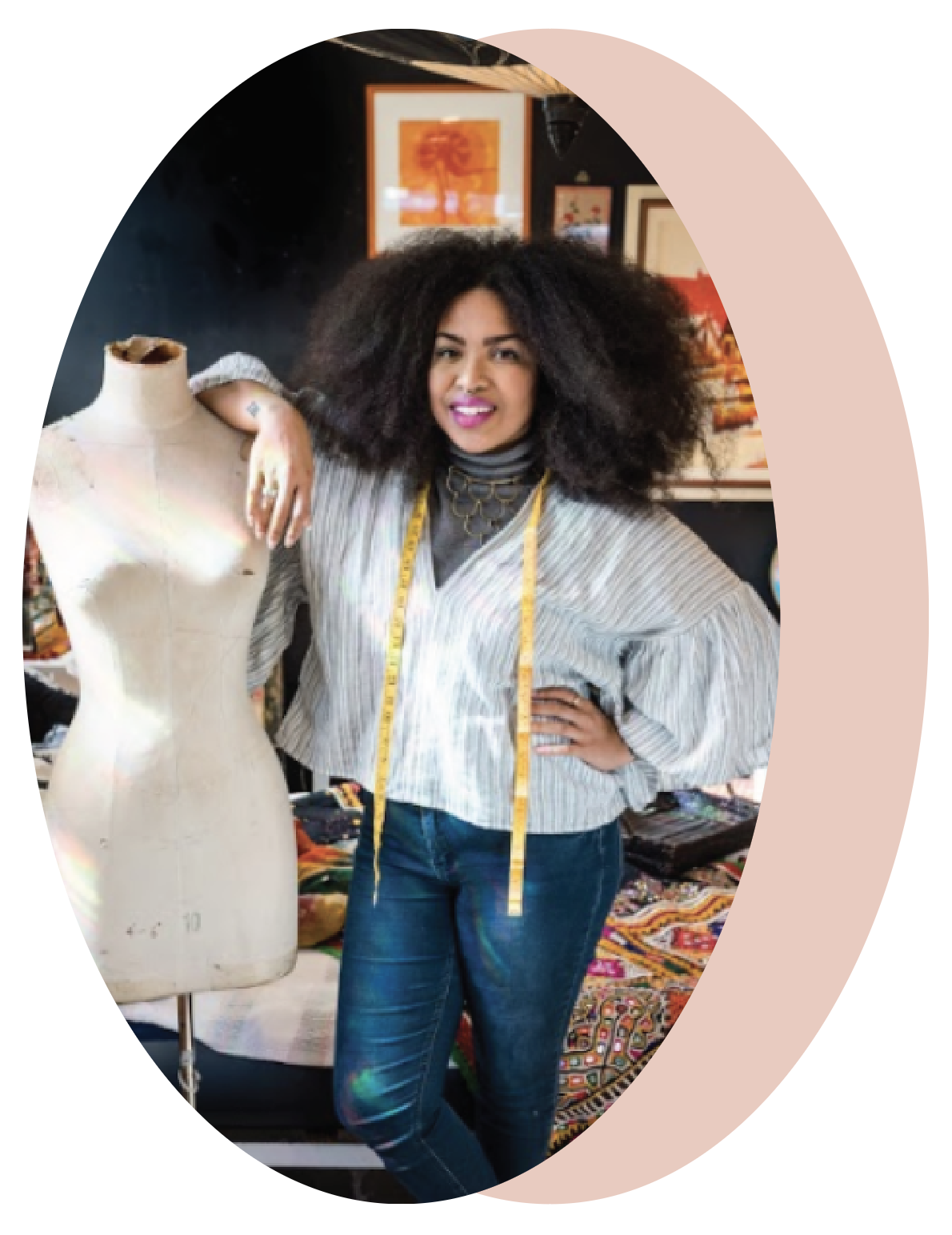
This became especially important to Drea and her team at Hidden Opulence now with coronavirus.
Drea: I’m starting to see the statistics and the numbers of coronavirus and how it’s disproportionately impacting communities of color—the Black community.
Drea decided that she had to do something to help the Black community in Portland. But, as a small, Queer, Black female-owned business, she didn’t know if she had the means to do anything impactful, especially when compared to other organizations and businesses in the area.
Drea: Portland is a place that is a bubble of privilege. I was feeling super guilty that I couldn’t give as much as other people. It’s because everybody has the privilege to give. You’re a small business, you’re a minority-owned business, and a woman—a queer woman. You’re just trying to make it. [I was] hurting-feeling bad because this person is like ‘We gave X amount away,’ and ‘We’re sewing this many hundreds of masks.’ How am I going to pivot when we’re just trying to barely get our orders filled and back to the people?
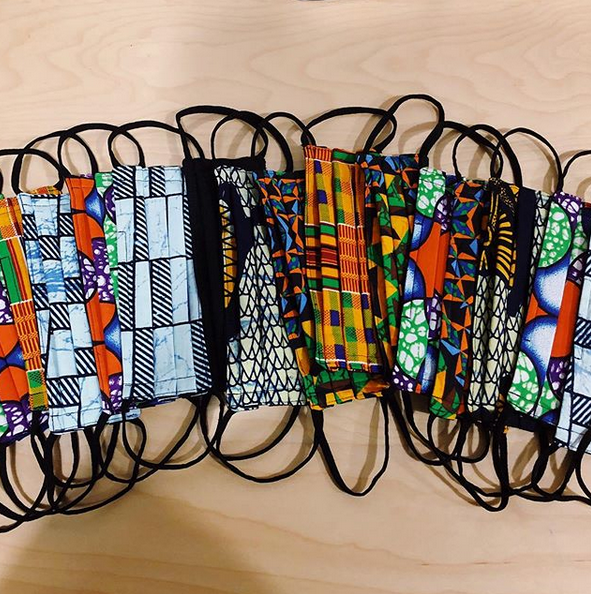
Despite her fears that she wouldn’t be able to balance keeping her business afloat and shifting some of her resources to help her community, Drea felt compelled to do something. She reached out the Facebook Group, Black Portland, and sent a message out to its members.
Drea: I believe it was on Juneteenth. I was like, ‘Alright, I’m going to do it.’ So, I said, ‘Who needs a mask? Comment.’ And then, I was like, ‘Oh my god, there’s so many people.’ So I had my intern put together a spreadsheet. And, we’re just going through every single one—like timestamp—and just put them in a list. We made the list first round, and then we were like, ‘There’s so many more people that need masks.’
Drea and her team created a donation option on the Hidden Opulence website to try meet the growing demand for masks from the Black Portland group. A customer can purchase a mask and choose to “Pay it Forward” to a member of the BIPOC community.
Drea: We need the ability of somebody to pay it forward to somebody—a BIPOC...So, it’s like a waterfall. Basically, if someone isn’t paying, or an ally isn’t paying for the mask, then I can’t do it. That’s the struggle. The first round was around 60 and I only had like 20 donations. So that freaked me out.
So, Drea put out the word on social media to get people to spread the word and elicit more donations. She plans to continue her efforts to engage her creative practice and business in social activism long after the coronavirus. She’s chosen to use her various platforms and voice in the small business and maker community to address issues that matter to her and that are often underrepresented in those forums.
Drea: Our biggest platform is social media (notably Instagram). This helps us to meet folks that are at the discovery level of either sewing or sustainability.
Being a QPOC-owned business allows me to go further than that and shine the spotlight on Black, Brown, and Queer issues/folx that have always been a part of sewing and sustainability. Sewing is so much deeper than just an activity for the retired middle-aged white woman—I hope our platform is a reminder of that for others.
So, how can the Seamwork community best help with Drea’s mask donation effort?
Drea: If you are part of the Seamwork Community and want to help Hidden Opulence by getting masks to Portland’s Black Community, you can help in a few ways!
-
Purchase a mask from us for donation—it’s a two for one deal—the cost goes to pay me and the team to produce them, supplies needed to do so, and shipping to our recipients. (Here is a link to purchase a mask)). -
Donate directly—We can accept donations through PayPal and Venmo to pay the team and I for these efforts. (@hidden-opulence Venmo). -
Donate Fabric—You can send us fabrics to use to create these masks. We are in need of plain black fabric or fabric with Afrocentric and Multiethnic designs. The fiber content needs to be cotton or linen blends.
Shipping address:
3439 SE Hawthorne Blvd # 1022, Portland, OR, USA.
